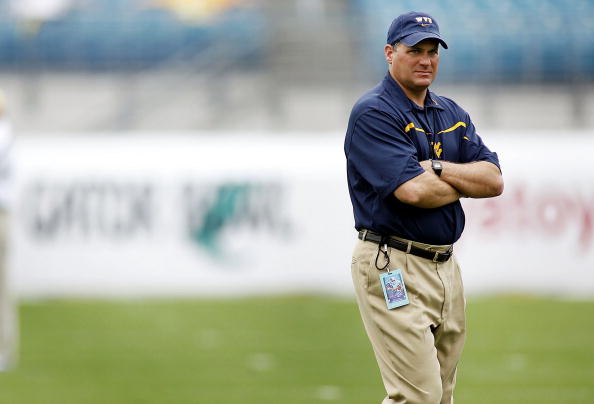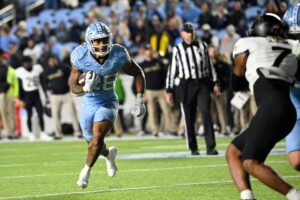Mountaineer Moments in Adversity Part Four
As Fall Camp rapidly approached, we turn up the heat on our Mountaineer Moments in Adversity series. We already covered the Mountaineers’ first-ranked win (over Pitt), their move to the Big XII, and a season-shifting win over number-three Baylor. This time, we continue the trend from part three by focusing on yet another season-shifting win, this time over a long-time rival. Before we tell you more, we want to set the stage first.
The End of an Era and Beginning of Another
As we wrote several years ago, West Virginia owes a tremendous debt to former Head Coach Don Nehlen for ushering the Mountaineers into the modern era and establishing them as a nationally-recognized brand. After the 2000 season, however, Nehlen stepped down as head coach ending a 21-season tenure. Thus began the Rich Rodriguez era. During the 2001 season, Mountaineer fans wondered whether West Virginia made the right hire. Indeed, West Virginia finished the season with just three wins and suffered lopsided losses to Virginia Tech (0-35) and Miami (3-45) in the process.
In 2002, however, West Virginia flipped the script by going two and two against top-25 teams and finishing the season with nine wins. In his sophomore season, Rasheed Marshall found his footing in Rodriguez’s spread option offense. With his having two more seasons to go, excitement among the fan base found itself at a fever pitch.
Unfortunately, WVU stumbled off the blocks in the 2003 season, limping out to a one-and-four start. After beating Rutgers, they went into game seven with just two wins. Things looked bleak, to say the least, and fans again questioned whether Rodriguez represented the right hire after Nehlen’s retirement.
Shifting the Season
That said, the spirit of the Mountaineer remains. From WVU’s website, the Mountaineer allows the fan to be “constantly reminded of the strength and courage of the people in” the Mountain State. That strength and courage find themselves particularly on display at times when the Mountaineers face adversity. Going into game seven of the 2003 season, Rodriguez and his team definitely stared down adversity.
In this iteration, that adversity had a familiar face. The Virginia Tech Hokies rode into Morgantown ranked third in the nation at the time. Heading into the game, the Hokies’ offense averaged 45.5 points per game and gave up just 14.8 points per game to opponents. The matchup certainly did not appear favorable.
To everyone’s surprise, however, the game started slow. The first 11 minutes produced zero points. The Mountaineers broke the goose eggs with a Kay-Jay Harris rushing touchdown. Quincy Wilson followed that up with a rushing touchdown just two minutes later. Just like that, West Virginia jumped out to a 14-0 lead to end the first quarter.
Near the end of the first half, the Hokies put themselves on the board with a fumble recovery for a touchdown to close the gap to 14-7 heading into halftime. In the third quarter, however, the Mountaineers hit pay dirt twice more to expand the lead to 28-7 heading into the final frame. Their defense stood strong, and West Virginia surprised the nation with a huge 28-7 over the Hokies. In the process, they forced four turnovers and held the Hokies to just over 200 yards of total offense. The win truly flipped the season as the Mountaineers finished 8-4 in Rodriguez’s third season as head coach.
Establishing a Theme
Unknown to fans at the time, the 2003 season represented the beginning of a trend and theme that would accelerate through the Rodriguez era. Dual-threat quarterbacks would offer the Mountaineers some of their best football played to date (and which has not been matched since). This game represents, in many ways, a seismic shift in West Virginia’s identity that would add to its national brand.
As a result, we simply could not proceed with our Mountaineer moments in adversity without mentioning this tremendous upset win.






